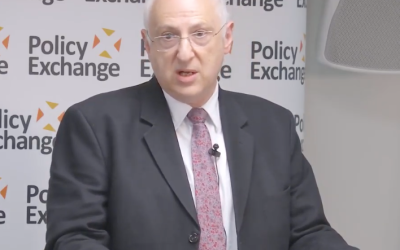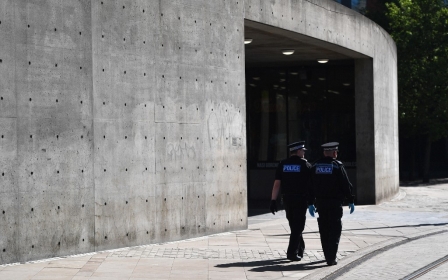Prevent critics launch alternative review of UK counter-terrorism strategy

Critics of the UK government's Prevent strategy have launched an alternative review of the divisive counter-terrorism programme amid concerns that an official review amounts to a whitewashing exercise.
In a call for evidence on Tuesday, Prevent Watch, a campaign group that has previously called for Prevent to be abolished, said its “people's review” would provide a platform for those negatively impacted by the strategy and organisations committed to a boycott of a government-backed review.
“This is the first and historic community grassroots-led review of the Prevent programme which placed the people most impacted by the Prevent programme at the centre,” said Layla Aitlhadj, director of Prevent Watch and a co-chair of the review.
The initiative comes after the Home Office's appointment in January of William Shawcross to head its long-delayed review of Prevent was widely rejected by Muslim community organisations and human rights and civil liberties campaigners.
In a statement announcing a boycott of the review in February, organisations including Amnesty International and Liberty said Shawcross, a former director of the Henry Jackson Society, had “patently expressed Islamophobic views”. Shawcross has said that his views have been “misrepresented or misinterpreted”.
They said his appointment “made clear, beyond doubt, that the UK government has no interest in conducting an objective and impartial review of the strategy, nor in engaging meaningfully with communities affected by it”.
John Holmwood, an emeritus professor of sociology at Nottingham University and co-chair of the alternative review, told Middle East Eye it was important that the voices of critics of Prevent were not lost due to the boycott of the official review.
Holmwood, who has written for MEE, said the government had a poor record of establishing the independence of its inquiries, citing criticism of a recent report by race and equalities commissioner Tony Sewell, which concluded that institutional racism in the UK did not exist.
“The government has described its review as independent and will use it to legitimate further reinforcements of a failed policy. It is important that the boycott of the review also coincides with a presentation of evidence to coincide with the publication of the review,” said Holmwood.
'Alms to the oppressed'
The launch of the review comes with Prevent once again under scrutiny after it was reported that an 11-year-old boy was referred to the police over comments in school in which he spoke about giving “alms to the oppressed”.
According to reports, the boy's teacher believed he had said “arms” rather than “alms”.
What is the Prevent Strategy?
+ Show - HidePrevent is a programme within the British government's counter-terrorism strategy that aims to “safeguard and support those vulnerable to radicalisation, to stop them from becoming terrorists or supporting terrorism”.
It was publicly launched in the aftermath of the 2005 London bombings and was initially targeted squarely at Muslim communities, prompting continuing complaints of discrimination and concerns that the programme was being used to collect intelligence.
In 2011, Prevent's remit was expanded to cover all forms of extremism, defined by the government as “vocal or active opposition to fundamental British values, including democracy, the rule of law, individual liberty and mutual respect and tolerance of different faiths and beliefs.”
In 2015, the government introduced the Prevent Duty which requires public sector workers including doctors, teachers and even nursery staff to have “due regard to the need to prevent people being drawn into terrorism”.
A key element of Prevent is Channel, a programme that offers mentoring and support to people assessed to be at risk of becoming terrorists. Prevent referrals of some young children have proved contentious. 114 children under the age of 15 received Channel support in 2017/18.
Criticism of the Prevent Duty includes that it has had a “chilling effect” on free speech in classrooms and universities, and that it has turned public sector workers into informers who are expected to monitor pupils and patients for “signs of radicalisation”. Some critics have said that it may even be counter-productive.
Advocates argue that it is a form of safeguarding that has been effective in identifying and helping troubled individuals. They point to a growing number of far-right referrals as evidence that it is not discriminatory against Muslims.
In January 2019 the government bowed to pressure and announced that it would commission an independent review of Prevent. This was supposed to be completed by August 2020. After being forced to drop its first appointed reviewer, Lord Carlile, over his past advocacy for Prevent, it conceded that the review would be delayed.
In January 2021 it named William Shawcross as reviewer. Shawcross's appointment was also contentious and prompted many organisations to boycott the review. Further delays followed. Shawcross's review, calling for a renewed focus within Prevent on "the Islamist threat", was finally published in February 2023 - and immediately denounced by critics.
Under the Prevent Duty, teachers and other public-sector workers are required to report anyone deemed to be “vulnerable to radicalisation”.
The police took no further action. But the boy's parents are taking legal action against the school over the referral, the Guardian reported on Monday.
The government committed to commissioning an independent review of Prevent in early 2019, following years of criticism of its flagship counter-terrorism strategy by human rights groups and Muslim community groups, who complained that it was discriminatory, counter-productive and has had a “chilling effect” on freedom of speech.
But the process has been mired in delays and controversy. The Home Office's initial appointee, Lord Carlile, was forced to step down following a legal challenge over his past advocacy for Prevent.
Shawcross is due to complete his review by August and the deadline for the submission of evidence expired on 9 June.
Online engagement events
But on Monday, the Home Office announced a series of “online engagement events” to be held next month, which it said would inform Shawcross's final report.
It said it wanted members of the public to share their views on key issues, including “the impact of Prevent on individuals, families and communities”.
“I am conducting this review without fear or favour and would encourage anyone with a knowledge of Prevent, either through lived experience, or their paid or voluntary work, to attend and share their thoughts,” said Shawcross.
But Holmwood told MEE that the experience of being referred to Prevent might deter people with critical views of the programme from engaging with the Shawcross review.
“The experience of referrals has been very traumatic for many families and they are unlikely to wish to repeat it. This is why having a proper independent review that could command trust was so important,” he said.
MEE has contacted the Independent Reviewer of Prevent and the Home Office for comment.
Middle East Eye propose une couverture et une analyse indépendantes et incomparables du Moyen-Orient, de l’Afrique du Nord et d’autres régions du monde. Pour en savoir plus sur la reprise de ce contenu et les frais qui s’appliquent, veuillez remplir ce formulaire [en anglais]. Pour en savoir plus sur MEE, cliquez ici [en anglais].






